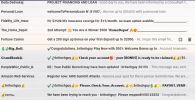britechguy
Well-Known Member
- Reaction score
- 5,075
- Location
- Staunton, VA
I am becoming more and more frustrated in trying to find some single (or even a couple) resource that will indicate on an email client basis which, when you use their "mark as spam/junk" function, send that information to the email service provider AND which email service providers actually accept that information for tweaking their spam filters.
It seems, for instance, that Outlook tries to pass this information through but if it does it's clear that not nearly all email service providers accept it for filter tweaking.
The same seems to apply to "block this sender," too, and there are many reports of people repeatedly using "block sender" in Outlook yet, the next day, another message (or raft of messages) from that same sender somehow make it through without either Outlook or the email service provider blocking them.
My observation over time is that the battle against spam was, to a significant extent, being won for some years but now it seems to be going just the opposite direction. Gmail still seems to have what I consider "the gold standard" of spam filtering. I can't recall the last time I saw a real spam message make it through to my inbox, or that of my clients, nor a valid message be marked accidentally as spam.
It seems, for instance, that Outlook tries to pass this information through but if it does it's clear that not nearly all email service providers accept it for filter tweaking.
The same seems to apply to "block this sender," too, and there are many reports of people repeatedly using "block sender" in Outlook yet, the next day, another message (or raft of messages) from that same sender somehow make it through without either Outlook or the email service provider blocking them.
My observation over time is that the battle against spam was, to a significant extent, being won for some years but now it seems to be going just the opposite direction. Gmail still seems to have what I consider "the gold standard" of spam filtering. I can't recall the last time I saw a real spam message make it through to my inbox, or that of my clients, nor a valid message be marked accidentally as spam.

